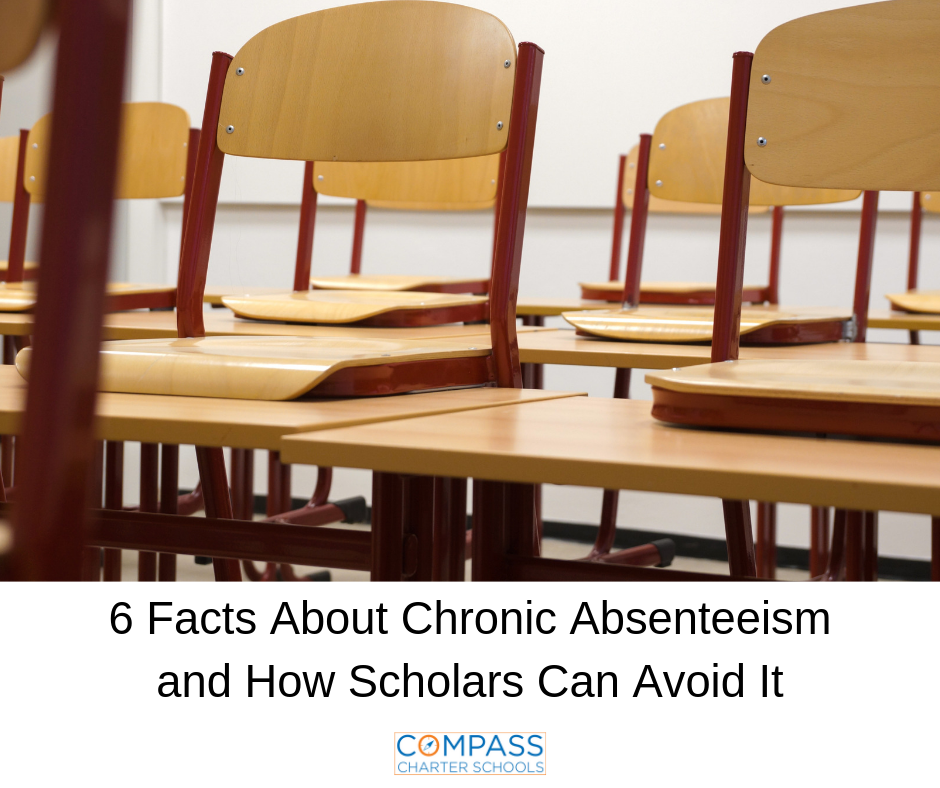
The first days of school depict images of backpacks stuffed with notebooks and unsharpened pencils, bulletin boards freshly decorated by teachers, and scholars smiling from ear-to-ear with excitement ready to begin learning.
But even in these early days of the new school year, some children are already heading toward academic trouble: They’re missing too many days of school. Across the country, nearly 8 million scholars miss nearly a month of school every year—absences that can correlate with poor performance at every grade level.
This year, Compass Charter Schools (CCS) is celebrating the Attendance Awareness Campaign, part of a nationwide movement intended to convey the message that every school day counts. To help raise awareness, we’re sharing six important facts about chronic absenteeism and how scholars can avoid becoming chronically absent.
Nationally, an estimated 5 million to 7.5 million scholars are at risk academically each year because they are chronically absent.
Scholars and their families need to know that missing 10 percent or more (about two days per month) of school days during the year is considered chronic absence, and this includes both excused and unexcused absences and suspensions.
Research shows young children who are considered to be chronically absent by third grade are less likely to read on grade level.
Starting as early as kindergarten and prekindergarten, chronic absence can have adverse consequences for academic achievement, research shows. By sixth grade, chronic absence becomes a warning sign that a scholar may drop out of high school.
By middle and high school, poor attendance is even more predictive of dropout.
After a few years of being chronically absent, scholars are likely not up to grade level in the core academic areas. They are often more likely to feel discouraged or embarrassed and may resort to dropping out of school because their chronic absenteeism has put them behind. Independent study programs like CCS can help reduce chronic absenteeism rates by making learning more easily accessible through a virtual environment. Scholars at CCS can learn from the comfort of their home, which can help decrease the number of possible causes for chronic absenteeism like transportation, illness, bullying and more.
Chronic absence is a sign that scholars and families may be experiencing barriers to getting to school.
Absences can often be prevented by identifying and resolving barriers to attendance. These can be related to transportation, bullying, inadequate supports for scholars with disabilities, a lack of financial resources, or a lack of engaging instruction. Parents and school staff can communicate about barriers for their scholars and work together to find solutions. For example, the counseling and special education teams at CCS help scholars work through any social, emotional or academic challenges that they may be facing. They partner with other school staff to help find solutions to ensure that scholars have the tools that they need to succeed.
Scholars are more likely to attend school if they feel safe (emotionally + physically), connected, supported, and believe they can learn and achieve.
School staff, especially teachers, play a primary role in creating an engaging school climate and culture that encourages scholars to attend and fosters self-efficacy. At many schools, like CCS, teachers demonstrate their support for scholars by leading school clubs, hosting virtual workshops, and chaperoning field trips. These activities can help scholars feel connected to their teachers and more encouraged to succeed in class. CCS has also partnered with the Energy Bus for Schools organization to create a positive and safe learning environment. The program helps school staff partner with scholars and learning coaches to create a bully-free, safe learning experience for all scholars.
Reducing chronic absence helps create more equitable academic outcomes, especially for children who live in poverty.
Children with certain risk factors— including poverty, chronic health conditions, homelessness, frequent moves, and disabilities—are especially hard hit since they can least afford to miss school. Encouraging scholars with these risk factors to attend school can increase their chances of being the first in their family to attend college and earn higher wages. Research shows, the wage gap between those with a college education and those without is wider than previous generations and the earnings gulf won’t narrow.
_____________________________________________________________________________________________________________
Compass Charter Schools (CCS) is a WASC-accredited virtual charter school that serves families throughout California. Interested in learning more about CCS’ flexible academic programs? Visit our website, or contact our enrollment team at enrollment@compasscharters.org or (877) 506-8631.
